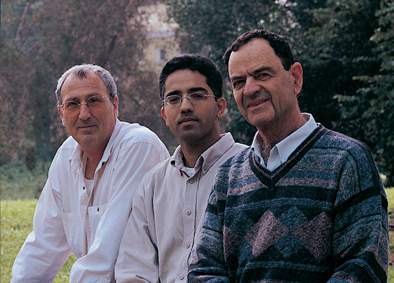Are you a journalist? Please sign up here for our press releases
Subscribe to our monthly newsletter:
Hundreds of potential drugs never make it to the clinic because they don’t stay in the body long enough to do their job. Small proteins shown to be effective against disease are often cleared by the kidneys within minutes and therefore cannot serve as drugs. Now Weizmann Institute scientists have developed a new strategy that could turn numerous small proteins and protein fragments into potent drugs.

The plan consists of dramatically increasing the protein’s mass. Like a sprinter weighed down by a heavy load, the modified protein finds its movement restricted; it is not whisked away by the kidneys and can stay in the bloodstream for hours. This approach is based on a method known as PEGylation: several chains of polyethylene glycol, or PEGs, are attached to the protein. PEGylation has been around for nearly two decades, but it hasn’t been widely used to turn small proteins into drugs because it comes with a catch: the same chains that make the protein heavy may also render it nearly useless; they take up its active sites, hindering its healing action in the body.
The new Weizmann Institute strategy, which can be described as “reversible PEGylation,” overcomes this problem. The protein is PEGylated with chainlike structures held in place by reversible chemical bonds that dissolve in the bloodstream. Once the chains fall off, the protein’s medicinal action is restored. Moreover, the chains do not all dissolve at once, so the active protein is released in a slow, continuous and predictable manner – an ideal way to provide a steady supply of the drug for optimal effect. The approach was developed by Prof. Yoram Shechter of the Biological Chemistry Department, Prof. Mati Fridkin of the Organic Chemistry Department and Dr. Haim Tsubery of both departments.
Potential protein drugs treated with the new approach have already been shown to be effective in laboratory animals. A single injection of a protein fragment drug that reduces blood glucose levels in rodents with Type 2 diabetes was effective for three days. A single injection of a reversibly PEGylated growth hormone, a small protein, corrected the effects of growth-hormone deficiency in rats over a period of four days. And the activity span of a short-lived protein fragment that may be extremely useful in the treatment of obesity and related disorders was extended dramatically following PEGylation by the new method.
Several companies with protein drugs in the pipeline have already expressed interest in the new strategy. Yeda Research and Development Co. Ltd., the Institute’s technology transfer arm, has filed a patent application for the approach.
Prof. Mati Fridkin’s research is supported by the Helen and Martin Kimmel Center for Molecular Design; the Paul Godfrey Foundation; the Philip M. Klutznick Fund for Research; the Levine Institute of Applied Science; the Dr. Ernst Nathan Fund for Biomedical Research; and Mr. and Mrs. Luis Stillmann, Mexico. Prof. Fridkin is the incumbent of the Lester B. Pearson Professorial Chair of Protein Research.
Prof. Yoram Shechter’s research is supported by the Levine Institute of Applied Science and the Howard M. Siegler Foundation. Prof. Shechter is the incumbent of the Charles H. Hollenberg Professorial Chair of Diabetes and Metabolic Research.